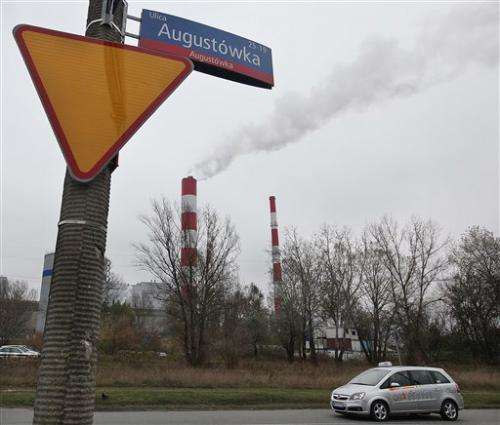Coal-rich Poland ready to block EU climate deal

European Union leaders meeting in Brussels to set their new greenhouse gas emissions plan are facing staunch opposition from coal-reliant Poland and other East European countries who say their economies would suffer from the new target.
Poland says it's ready to veto the plan that would oblige the bloc's 28 states to jointly cut their greenhouse gas emissions to 40 percent below the 1990 levels by the year 2030. The EU plan would also require climate-friendly, renewable energy to provide 27 percent of the bloc's needs and demand that energy efficiency increase by a third in the next 16 years.
Poland says that pace is too fast for Eastern European countries that are trying to grow their economies as they restructure old, energy-dependent industries.
Almost 90 percent of Poland's electricity comes from coal. The nation intends to continue that way for decades because mining creates 100,000 direct jobs and many thousands more in related sectors. Warsaw argues that green energy, large wind farms and solar panels still create energy that is too expensive.
But a failure to set the new emissions goal at the two-day European summit starting Thursday would delay the groundwork for a crucial global climate deal that is expected to be signed in Paris next year. It would also undermine the EU's position as the leader in the global push to reduce the carbon emissions that scientists say are driving climate change.
"The objective is to agree ... (on) the world's most ambitious, yet cost-effective and fair climate and energy policy framework for the next decade," EU Council President Herman Van Rompuy said.

Last month Poland and five other countries that rely on fossil fuels said while they agree with the need to cut emissions, they will not be forced into any legally binding deals that overlook the realities of their economies.
The emission reduction targets "must be set realistically," said a statement signed by Poland, the Czech Republic, Bulgaria, Romania, Slovakia and Hungary.
Those nations say the proposed EU targets would raise their energy prices and slow down their developing industries at a time when they are still recovering from the global economic crisis.
"My government will not agree to documents that would mean additional costs for our economy and higher energy prices for the consumers," new Polish Prime Minister Ewa Kopacz said recently.
Poland has called for getting some compensation from richer EU countries for the heavy burden that steep emissions cuts would place on its economy. Environmentalists, however, worry that Poland would use that money to modernize its coal industry, which they say needs to be phased out to truly tackle climate change.
Even modern energy-efficient coal plants have higher emissions than most other sources of energy.
"Making coal-powered plants more efficient is in the longer term just a waste of money, because in the long term we would need to get out of coal completely," said Wendel Trio, director of Climate Action Network Europe.
Even though it's so dependent on coal, more than 10 percent of Poland's energy comes from renewable sources like biofuels and small wind farms, chiefly along the Baltic Sea coast. Poland's target for 2020 is to have 15 percent of its energy from renewables.
Poland's first nuclear power plant is still only on paper but is expected to begin operating in the mid-2020s, while exploration continues for commercially viable shale gas deposits.
Poland can point to some climate-change success stories. It has reduced its carbon emissions by 30 percent compared with 1988 levels while expanding its economy by 130 percent. The use of energy by the country's industries has also decreased 7 percent per year since the early 1990s, compared with the EU's average of 2.2 percent per year. That is partly the result of the closing of post-communist heavy industries while new, cleaner sectors like electronics emerge.
"You can't say that we are a dogmatic opponent of the climate policy," the Polish foreign ministry said in a statement.
© 2014 The Associated Press. All rights reserved.



















